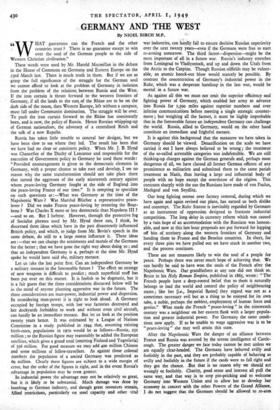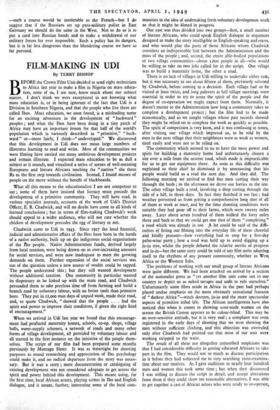GERMANY AND THE WEST
By NIGEL BIRCH M.P.
HAT guarantees can the French and the other countries trust ? There is no guarantee except to win over the soul of the German people to the side of Western Christian civilisation."
These words were used by Mr. Harold Macmillan in the debate in the House of Commons on Germany and Eastern Europe on the 23rd March last. There is much truth in them. But if we are to grasp the full significance of the struggle for the German soul we cannot afford to look at the problem of Germany in isolation from the problem of the relations between Russia and the West. If the iron curtain is thrust forward to• the western frontiers of Germany, if all the lands to the east of the Rhine are to be on the dark side of the moon, then Western Europe, left without a carapace, must fall under Communist domination. The struggle will be over. To push the iron curtain forward to the Rhine has consistently been, and is now, the policy of Russia. Hence Russian whipping-up of German nationalism, the advocacy of a centralised Reich and the talk of a new Rapallo.
Russia has taken little trouble to conceal her designs, but we have been slow to see where they led. The result has been that we have had no clear or consistent policy. When Mr. J. B. Hynd was Chancellor of the Duchy of Lancaster and responsible for the execution of Government policy in Germany he used these words: " Provided encouragement is given to the democratic elements in Germany, with a proper chance to take root and develop, I see no reason why the same transformation should not take place there that turned the aggressor of the early nineteenth century against whom peace-loving Germany fought at the side of England into the peace-loving France of our time." It is tempting to speculate on such questions as : —What was Germany at the time of the Napoleonic Wars ? Was Marshal Blucher a representative peace- lover ? Did we make France peace-loving by restoring the Bour- bons ? Was Charles X more or less democratic than Napoleon HI ? —and so on. But I forbear. However, through the protective fog of Socialist phrases used by Mr. Hynd there can, I think, be discerned three ideas which have in the past disastrously influenced British policy, and which, to judge from Mr. Bevin's speech in the same debate, do still to a large extent influence it. These ideas are : —that we can change the sentiments and morals of the Germans for the better ; that we have gone the right way about doing so ; and that an independent Germany is a, perhaps at the time Mr. Hynd spoke he would have said the, military menace.
Let us take the last point first. Can an independent Germany be a military menace in the foreseeable future ? The effect on strategy of new weapons is difficult to predict ; much superficial stuff has been put over on this matter. It is foolish to be dogmatic, but it is a fair guess that the three considerations discussed below will be in the mind of anyone planning aggressive war in the future. The three considerations are man-power, industrial power and dispersion. In considering man-power it is right to look ahead. A Germany occupied by foreign troops, with her war factories destroyed and her dockyards forbidden to work and without even civil aircraft, can hardly be an immediate menace. But let us look at the position twenty years hence. It was estimated by a League of Nations Committee in a study published in 1944 that, assuming existing birth-rates, populations in 1970 would be as follows—Russia, 251 million ; to the Russian figure may reasonably be added the European satellites, which gives a grand total (omitting Finland and Yugoslavia) of 356 million. For good measure we may add 400 million Chinese and some millions of fellow-travellers. As against those colossal numbers the population of a united Germany was predicted as 69 million. Clearly these figures are subject to a wide margin of error, but the order of the figures is right, and in the event Russia's advantage in population may be even greater.
In industrial power the advantage may not be relatively so great, but it is likely to be substantial. Much damage was done by bombing .to German industry, and though great resources remain, Allied restrictions, particularly on steel capacity and other vital
war industries, can hardly fail to ensure decisive Russian superiority over the next twenty years—even if the Germans were free to start re-arming tomorrow. The third factor—dispersion—might be the most important of all in a future war. Russia's industry stretches from Leningrad to Vladiyostock, and up and down the Urals from the Arctic to the Caspian. Though Russian oilfields may be vulner- able, an atomic knock-out blow would scarcely be possible. By contrast the concentration of Germany's industrial power in the Ruhr, which was a desperate handicap in the last war, would be mortal in a future war.
As against all this we must not omit the superior efficiency and fighting power of Germany, which enabled her army to advance into Russia for 1,5oo miles against superior numbers and over inferior communications before meeting a single strategic counter- move ; but weighing all the factors, it must be highly improbable that in the foreseeable future an independent Germany can challenge the world. Russia, allied to Germany, would on the other hand constitute an immediate and frightful menace.
It is against this background that the measures we have taken in Germany should be viewed. Denazification on the scale we have carried it out I have always believed to be wrong ; the treatment of the so-called arrestable categories was indefensible. We are still thinking-up charges against the German generals and, perhaps most dangerous of all, we have classed all former German officers of any prominence as militarists and submitted them to the same pariah treatment as Nazis, thus leaving a large and influential body of people with no hope except the overthrow of the regime. This contrasts sharply with the use the Russians have made of von Paulus, Markgraf and von Seydlitz.
Our long fighting retreat over factory removal, during which we have again and again revised our plans, has earned us both dislike and contempt. The Ruhr Statute is inevitably regarded by Germans as an instrument of oppression designed to frustrate industrial competition. The long delay in currency reform which was caused by a vain hope of an accommodation with the Russians was lament- able, and now at this late hour proposals are put forward for lopping off bits of territory along the western frontiers of Germany and handing them to France and the Benelux countries. In short, for- every three pins we have pulled out we have stuck in another two, and the process continues.
These are not measures likely to win the soul of a people for peace. Perhaps there was never much hope of achieving that. We can hardly be said to have won the souls of the French after the Napoleonic Wars. Our grandfathers at any rate did not think so. Bryce in his Holy Roman Empire, published in 1865, wrote: "The French people have a deep-rooted belief that to them it naturally belongs to lead the world and control the policy of neighbouring states ; like her [i.e., Imperial Rome] they regard war not as a sometimes necessary evil but as a thing to be enjoyed for its own sake, a noble, perhaps the noblest, employment of human force and genius." What made the French " peace-loving in the nineteenth century was a neighbour on her eastern flank with a larger popula- tion and greater industrial power. For Germany the same condi- tions now apply. If to be unable to wage aggressive war is to be " peace-loving " she may well attain this state.
After the Napoleonic Wars the danger of an alliance between France and Russia was averted by the serene intelligence of Castle- reagh. The greater danger we face today cannot be met unless we are equally clear-headed. The Germans have behaved evilly and foolishly in the past, and they are probably capable of behaving as evilly and foolishly in the future if the cards were to fall right and they got the chance. But that is no reason why We should act wrongly or foolishly. Charity, good sense and interest all pull the same way, and that way is to stop pin-pricking and to welcome Germany into Western Union and to allow her to develop her economy in concert with the other Powers of the Grand Alliance. I do not suggest that the Germans should be allowed to re-arm
—such a course would be intolerable to the French—but I do suggest that if the Russians set up para-military police in East Germany we should do the same in the West. Not to do so is to put a card into Russian hands and to make a withdrawal of our military forces for ever impossible. Such a policy has its dangers, but it is far less dangerous than the blundering course we have so far pursued.







































 Previous page
Previous page